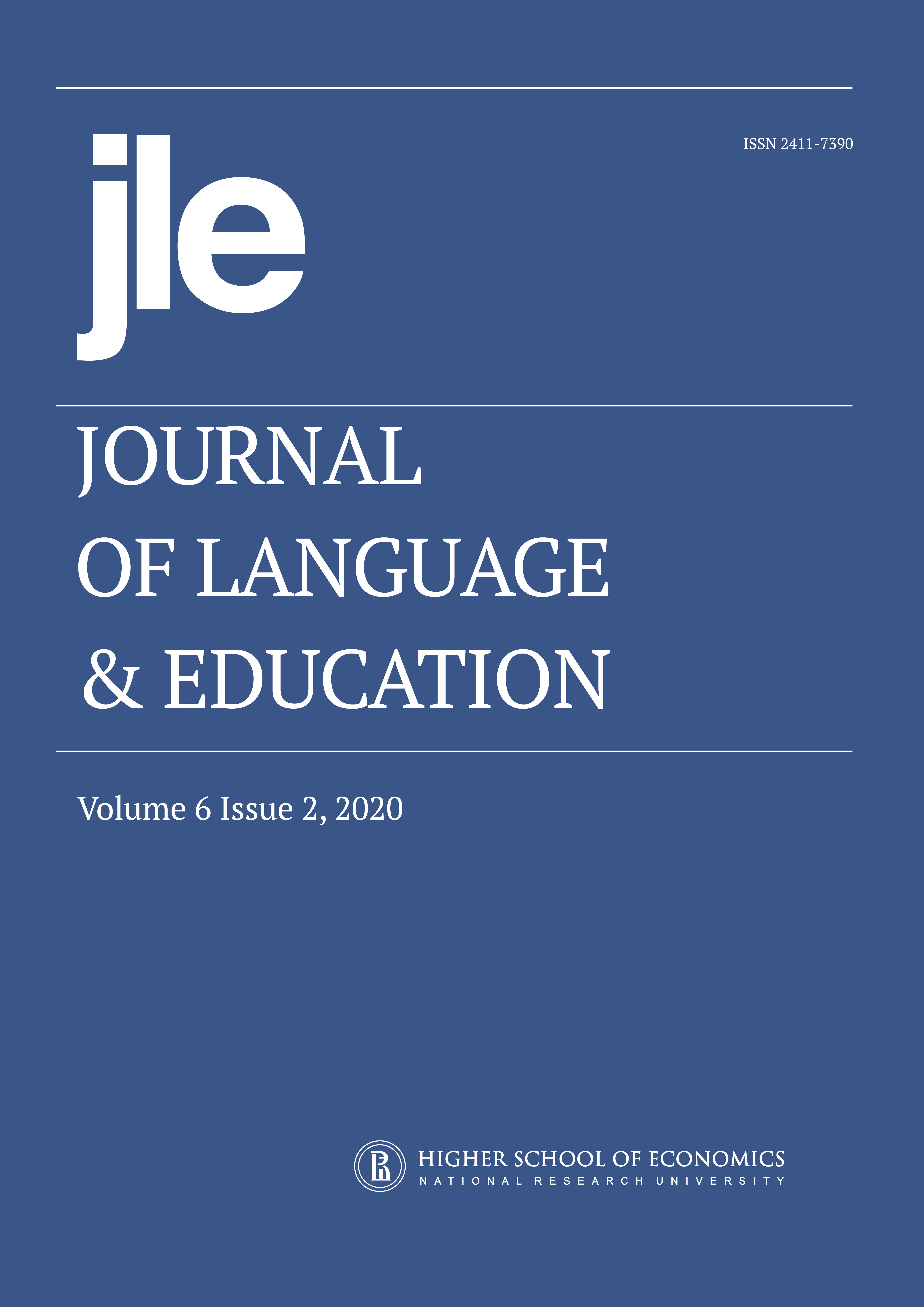Педагогическая рефлексия: источник практического знания и профессионального развития
Аннотация
Педагогические исследования обычно вызывают критику за их слишком общий характер, контекстуальную независимость и неадекватность в решении практических проблем учителей в их собственной образовательной среде. Более того, поскольку преподавание в школе сопряжено с многочисленными сложностями, учителя должны быть активными исследователями в собственных классах, чтобы максимально повысить эффективность своей работы и обеспечить оптимальные возможности для обучения своих учеников. Данное исследование призвано помочь учителям глубже понимать собственную педагогическую практику. В статье дано определение педагогической рефлексии и приведены аргументы в пользу ее необходимости и значимости в профессии учителя. В работе также рассмотрены трудности, с которыми обычно сталкиваются рефлексирующие учителя, и предложены меры по оказанию помощи учителям в их рефлексии относительно образовательного процесса. Мы полагаем, что результаты данного исследования могут дать конкретные ценные практически ориентированные советы администрациям школ и учителям.
Скачивания
Литература
Alexakos, K. (2015). Being a teacher | researcher: A primer on doing authentic inquiry research on teaching and learning. Sense.
Anwaruddin, S. M. (2019). Knowledge mobilization in TESOL: Connecting research and practice. Brill.
Borg, S. (2009). English language teachers' conceptions of research. Applied Linguistics, 30(3), 358-388.
Borko, H., Liston, D., & Whitcomb, J. (2007). Genres of empirical research in teacher education. Journal of Teacher Education, 58(1), 3-11.
Cain, T., & Allan, D. (2017). The invisible impact of educational research. Oxford Review of Education, 43(6), 718-732. DOI: https://doi.org/10.1080/03054985.2017.1316252
Cochran-Smith, M. (2012). A tale of two teachers: Learning to teach over time. Kappa Delta Pi Record, 48(3), 108-122. DOI: https://doi.org/10.1080/00228958.2012.707501
Cochran-Smith, M., & Lytle, S. L. (1999). Relationships of knowledge and practice: Teacher learning in communities. Review of Research in Education, 24, 249-305.
Dana, N. F., & Yendol-Silva, D. (2003). The reflective educator's guide to classroom research. Corwin Press.
Davis, S. H. (2007). Bridging the gap between research and practice: What's good, what's bad, and how can one be sure? Phi Delta Kappan, 88(8), 568-578. DOI: https://doi.org/10.1177/003172170708800804
Farrell, T. S. C. (2015). Promoting teacher reflection in second language education: A framework for TESOL professionals. Routledge.
Farrell, T. S. C. (2018). Operationalizing reflective practice in second language teacher education. Journal of Second Language Teacher Education, 1(1), 1-20.
Hiebert, J., Gallimore, R., & Stigler, J. W. (2002). A knowledge base for the teaching profession: What would it look like and how can we get one? Educational Researcher, 31(5), 3-15.
Hoong, L. Y., Chick, H. L., & Moss, J. (2007). Classroom research as teacher-researcher. The Mathematics Educator, 10(2), 1-26.
Kincheloe, J. L. (2011). The knowledges of teacher education. In K. Hayes, S. S. R., & T. K. (Eds.), Key works in critical pedagogy: Bold visions in educational research. Sense.
Kostiainen, E., Ukskoski, T., Ruohotie-Lyhty, M., Kauppinen, M., Kainulainen, J., & Mäkinen, T. (2018). Meaningful learning in teacher education. Teaching and Teacher Education, 71, 66-77. DOI: https://doi.org/10.1016/j.tate.2017.12.009
Liu, P., & Xiu, Q. (2019). Teacher professional collaboration in China: Practices and issues. Beijing International Review of Education, 1, 162-178. DOI: https://doi.org/10.1163/25902547-00101012
Loughran, J. J. (2002). Effective reflective practice: In search of meaning in learning about teaching. Journal of Teacher Education, 53(1), 33-43. DOI: https://doi.org/10.1177/0022487102053001004
Mathew, P., Mathew, P., & Peechattu, P. J. (2017). Reflective practice: A means to teacher development. Asia Pacific Journal of Contemporary Education and Communication Technology, 3(1), 126-131.
Medgyes, P. (2017). The (ir) relevance of academic research for the language teacher. English Language Teaching Journal, 71(4), 491 - 498. DOI: https://doi.org/10.1093/elt/ccx034
Mermelstein, A. D. (2018). Reflective teaching as a form of professional development. MEXTESOL Journal, 42(4), 1-14.
Miller, M. S., & Shinas, V. H. (2019). Inquiring about inquiry: A research journey. Journal of Practitioner Research, 4(1), 1-24. DOI: https://doi.org/10.5038/2379-9951.4.1.1093
Mills, G. (2000). Action research: A guide for the teacher researcher. Merrill/Prentice-Hall.
Renandya, W. A., & Floris, F. D. (2018). Supporting teacher research in English language teaching. ETAS Journal, 35(3), 1-2.
Loewen S., Sato M. (2019) Instructed second language acquisition and English language teaching: Theory, research, and pedagogy. In X. Gao (Ed.) Second handbook of English language teaching. Springer International Handbooks of Education. Springer. DOI: https://doi.org/10.1007/978-3-319-58542-0_60-1
Schön, D. A. (1983). The reflective practitioner: How professionals think in action. Basic Books.
Schön, D. A. (1987). Educating the reflective practitioner: Toward a new design for teaching and learning in the profession. Jossey-Bass.
Schutz, K. M., & Hoffman, J. V. (2017). I Practice Teaching: Transforming our professional identities as literacy teachers through action research. The Reading Teacher, 71(1), 7-12. DOI: https://doi.org/10.1002/trtr.1592
Stremmel, A. J. (2007). The value of teacher research: Nurturing professional and personal growth through inquiry. Voices of Practitioners, 2(3), 1-9.
Stringer, E. T. (2007). Action research (3rd ed.). Sage.
Vangrieken, K., Meredith, C., & Kyndt, E. (2017). Teacher communities as a context for professional development: A systematic review. Teacher and Teacher Education, 61, 47-59. DOI: https://doi.org/10.1016/j.tate.2016.10.001
Vaughan, M., & Burnaford, G. (2016). Action research in graduate teacher education: A review of the literature 2000-2015. Educational Action Research, 24(2), 280-299. DOI: https://doi.org/10.1080/09650792.2015.1062408
Walton, E., & Rusznyak, L. (2016). Approaches to assessing preservice teachers' learning in authentic and rigorous ways: The case of an inclusive education module. Perspectives in Education, 34(1), 84-101. DOI: https://doi.org/10.18820/2519593X/pie.v34i1.7
Wiliam, D. (2019). Teaching not a research-based profession. https://www.tes.com/news/dylan-wiliam-teaching-not-research-based-profession.
Copyright (c) 2020 Национальный исследовательский университет «Высшая школа экономики»

Это произведение доступно по лицензии Creative Commons «Attribution» («Атрибуция») 4.0 Всемирная.
Авторы, публикующие статьи в журнале, соглашаются с условиями политики авторских прав.



